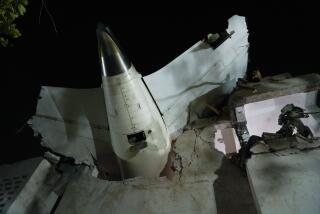Boeing Jet Deliveries at Standstill
- Share via
SEATTLE — Boeing Co. has now gone six days without delivering a commercial jet, largely a result of a walkout by nearly 20,000 engineers and technical workers, the aerospace giant said Monday.
Boeing will still meet its 2000 target of delivering 490 jets, priced from $30 million to $197 million, Boeing labor spokesman Peter Conte said.
But Conte declined to say if the absence of 500 employees that certify production processes and aircraft components on behalf of the Federal Aviation Administration would trim February deliveries.
“We of course have seen some slowing in the certification process, but the process continues and we are striving to make some deliveries in coming days,” Conte said.
The Society of Professional Engineering Employees in Aerospace, or SPEEA, said 90% to 95% of the 20,224 employees represented by its Seattle-area bargaining unit, or about 19,000, have walked off the job since Wednesday seeking better pay and benefits.
Boeing, which has said the strike participation has held steady at 75% to 80%, has confirmed one plane has been delayed, a 747-400 that cargo carrier Atlas Air Inc. had expected to pick up Friday.
Seattle-based Boeing has considered replacing some of the 500 SPEEA-represented designated engineering representatives that the union calls “the brains behind the planes” and a crucial group in keeping jets rolling off the assembly line.
Conte has declined to elaborate on reports that Boeing may use outside contractors or company managers to replace engineering designees or transfer employees from its Long Beach assembly plant, which is unaffected by the strike.
FAA spokesman Mitch Barker said Boeing had asked the agency to look at potential replacement designees.
SPEEA spokesman Bill Dugovich said the union is prepared to sit down and renew contract talks with Boeing at any time.
SPEEA has been without a contract since December, when more than 98% of its 13,500 dues-paying members voted to reject Boeing’s first proposal.
An ensuing offer with better pay prospects and without a controversial 10% medical premium was rejected by a much closer vote.
More to Read
Inside the business of entertainment
The Wide Shot brings you news, analysis and insights on everything from streaming wars to production — and what it all means for the future.
You may occasionally receive promotional content from the Los Angeles Times.










